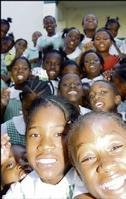
Students of St. Georges Girls Primary & Infant School at 80 Duke Street, Kingston join in the demonstration organised by the Hear the Children Cry Committee against violence towards children outside the school on Wednesday, March 8.- ANDREW SMITH/PHOTOGRAPHY The following article was written by Canon Ernle Gordon on behalf of the Public Theology Forum, an ecumenical grouping of local ministers of religion
WE CANNOT talk about human rights in a vacuum or celebrate a new Charter of Rights without connecting with the colonial context which failed to enable the Jamaican smaddy to reflect the image and likeness of God. And while we cannot blame all our present dysfunctions on the past, we must embark on an overview of our human rights journey in the local context.
According to sociologist Orlando Patterson, the nuclear family could hardly exist in slavery, because such an institution was strongly discouraged. The male was never allowed to assert his responsibilities as a husband or as a father. His wife was immorally claimed as the property of another and so the male was demoralised and dishonoured and therefore lost pretensions of an equal partner in family and community development.
AMBIVALENCE
During slavery there was some amount of ambivalence with regard to the role of mothers in that there was a combination of extreme cruelty and affection for children. It was suggested that a mother's cruelty to her children was part of the displacement of aggression and hatred for the 'bukki massa'. We have noticed the perpetuation of family violence in our age especially with regard to children, thus supporting the notion that some parents have been socialised into a culture of internecine violence.
According to historian Douglas Hall (1972), British colonialism has deliberately encouraged a deformed psyche which has caused us to inherit a feeling that everything that is achieved by the Jamaican must be authenticated by the metropole. Therefore, there is the prevalence of self-contempt as we tend to be too dependent upon the approval of Euro-American confirmation of our cultural achievements. We doubt ourselves and are very hesitant in applauding or endorsing our own national and regional accomplishments. A Jamaican theologian asserted that the tendency to be self-disparaging, personally and collectively, reflects the adverse nature of our spirituality. This attitude was displayed by some councillors in St. Elizabeth who alluded that they could not be associated with the programme to support the celebration of the abolition of the slave trade.
HUMAN DIGNITY IS DIVINE
Gary Zukav, in his book the Seat of the Soul wrote that our deepest understanding tells us that a truly evolved being is one that values others more than it values itself, and values love more than it values the physical world.
Jesus reminded us that we must love our neighbours as we love ourselves, and our Lord is the finest example of true humanity. Human dignity is inviolable and must be respected, because by nature we are made in the image and likeness of God. We open ourselves to undermine and harm humanity when we disconnect humankind from the divine source of origin.
The Jamaican people are part of God's creation, with a unique cultural and racial variety. However, there is a particular Caribbean socio-cultural mosaic that enshrines a hybrid character about our specific identity. This humanity has to be treasured and respected because God was enfleshed in the person of Jesus Christ who has always been involved in the pained and celebrated history of Caribbean people.
The right to equal respect reveals to us that human rights are a gift of God and the highest form of human participation is to be a co-creator with God. There has to be mutual respect for children and the elderly and there is an urgent need to strengthen all structures for the protection in order that all may experience fullness of life (John 10:10). It is also important to remember that a disabled person is not disabled in God's eyes. Peter has exhorted us in Acts 10:28 and 34, "That God has shown me that I should not call any man impure or unclean. I most certainly understand now that God is not one to show partiality".
The right to a wholesome family life demands a sense of reproductive responsibility, and although we have the right of choice we also have to face the consequences of our choice. The fullness of life has to be supported by social security, social assistance, proper health care and an eco-system that sustains all of life
Augustine of Hippo affirmed that to be truly human is to be truly divine, and so we should never forget that the defence of human rights is at the heart of the Church and the Gospel, and ought not to be relinquished to alternate institutions for justice whether they be local or international.
Members of the Public Theology Forum are Revs. Neville Callam, Byron Chambers, Ernle Gordon, Roderick Hewitt, Stotrell Lowe, Richmond Nelson, Garnet Roper, Ashley Smith, Burchell Taylor, Karl Johnson and Wayneford McFarlane. EDITOR

